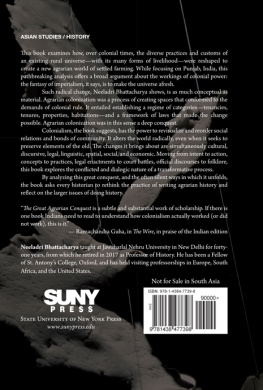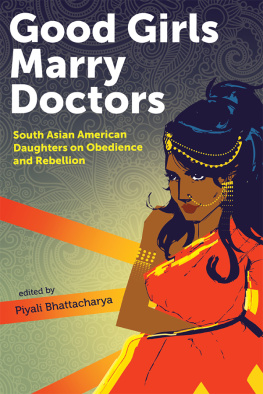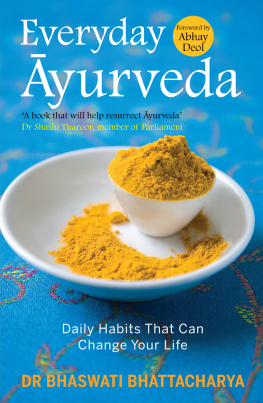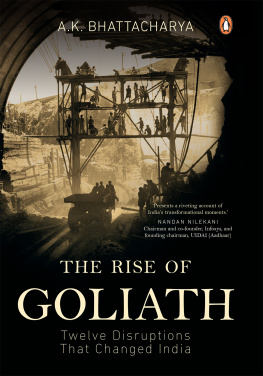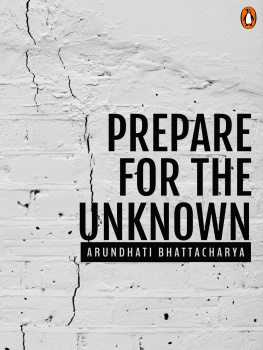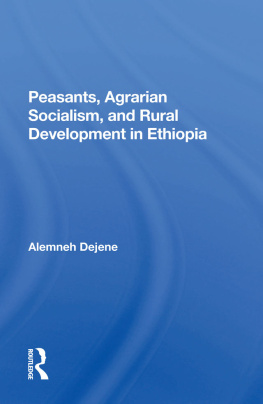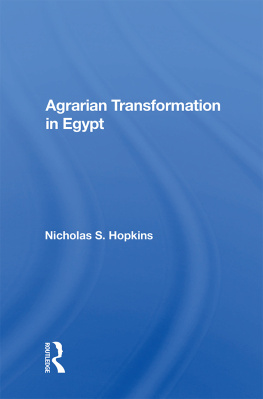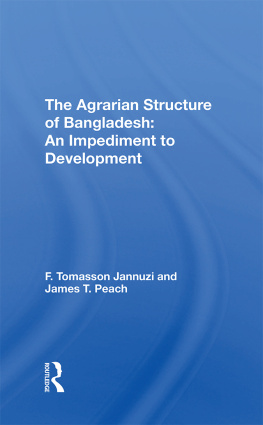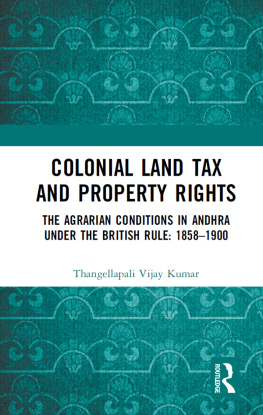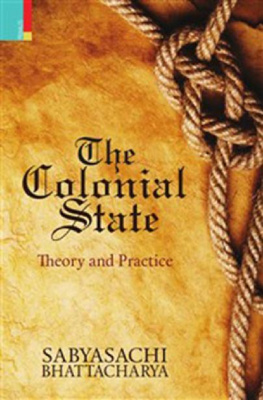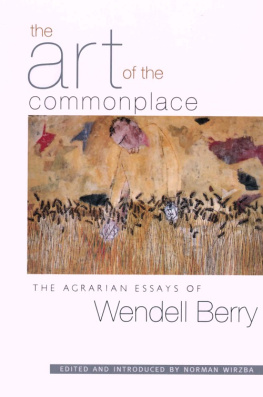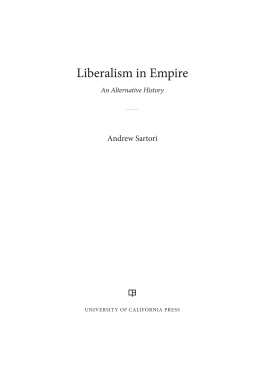THE GREAT AGRARIAN CONQUEST
NEELADRI BHATTACHARYA
The Great Agrarian
Conquest
THE COLONIAL RESHAPING
OF A RURAL WORLD
The Great Agrarian Conquest: The Colonial Reshaping of a Rural World by Neeladri Bhattacharya was first published by Permanent Black, D-28 Oxford Apts, 11 IP Extension, Delhi 110092 INDIA, for the territory of SOUTH ASIA.
Not for sale in South Asia
Cover: The Past Comes in Fragments, ceramic installation by Manisha Bhattacharya
Cover design by Anuradha Roy
Published by State University of New York Press, Albany
2019 Neeladri Bhattacharya
All rights reserved
Printed in the United States of America
No part of this book may be used or reproduced in any manner whatsoever without written permission. No part of this book may be stored in a retrieval system or transmitted in any form or by any means including electronic, electrostatic, magnetic tape, mechanical, photocopying, recording, or otherwise without the prior permission in writing of the publisher.
For information, contact State University of New York Press, Albany, NY
www.sunypress.edu
Library of Congress Cataloging-in-Publication Data
Names: Bhattacharya, Neeladri, author
Title: The great agrarian conquest: the Colonial reshaping of a rural world
Description: Albany : State University of New York Press, 2019 | Includes bibliographical references.
Identifiers: ISBN 9781438477398 (hardcover : alk. paper) | ISBN 9781438477411 (e-book)
Further information is available at the Library of Congress.
10 9 8 7 6 5 4 3 2 1
for
Isha
and
J.N.U.
as it was
Contents
FIGURES AND MAPS
Acknowledgements
A BOOK THAT TAKES SHAPE over many years rests on a bedrock of support from people and institutions. Threads of ideas at conferences, incitement to thought in conversations, comments on presentations at seminars, and discussions with colleagues, peers, and students have all helped shape my work. It is difficult often to disentangle the imprint of all these others in many of the arguments and analyses I offer here.
I owe most to the institution where I have taught for years, Jawaharlal Nehru University (J.N.U.), which has been a wonderfully stimulating place politically alive and intellectually energising. To the many students I have taught and mentored I owe more than they know. Discussions in classrooms and with research groups help students, certainly, but they also help teachers clarify ideas, pose new questions, and think up fresh ways of reflecting on issues.
The Centre for Historical Studies at J.N.U. has provided a supportive milieu for research and teaching, and I have been fortunate to have had great colleagues. Sabyasachi Bhattacharya nurtured me over my early years as a historian and has continued to offer intellectual advice. S. Gopal, Bipan Chandra, Satish Saberwal, and K.N. Panikkar offered encouragement that mattered. Discussions with Romila Thapar and Muzaffar Alam opened up for me the many deep layers of pre-modern histories; Kunal Chakrabarti and Kumkum Roy have never tired of dialogues across the chronological divisions that separate our specialisations; Radhika Singha, Janaki Nair and M.S.S. Pandian readily engaged with many of my conceptual concerns; Indivar Kamtekar and Sangeeta Dasgupta have been generous with their intellectual friendship.
E.P. Thompson encouraged me to explore the world of customary relations, sparking my early ideas in this terrain. Tanika Sarkar and Sumit Sarkar have been enthusiastic about this project since I first discussed it with them over dinner many years ago and have provided incisive comments on whatever I have given them to read. With Prabhu Mohapatra and Bodhisattva Kar I have debated many ideas that appear in this book. Conversations with Dipesh Chakrabarty are invariably intellectually stimulating; and discussions with David Ludden, K. Sivaramakrishnan, Gyan Prakash, and Ramachandra Guha with whom I share many academic concerns have always been productive. With Jairus Banaji I have reflected for long on the conceptual problems of agrarian history. From Rajeev Bhargava I have learnt the value of analytically separating out the different strands of a seemingly singular argument.
Various chapters of this book have in earlier forms been presented at the Center for South Asian Languages and Civilizations at the University of Chicago, the Center for South Asian Studies at Yale, the Centre for Modern Indian Studies at Gttingen, and at the Agrarian Studies Colloquium, Yale. Discussions in all these places have helped me think through my ideas and frame my arguments. I would like to thank in particular Ravi Ahuja, Tariq Thachil, and Aditya Sarkar for their thoughtful comments.
Officials at several libraries have helped my research: in Delhi, the Jawaharlal Nehru University Library, the Centre for Historical Studies DSA Library, the Nehru Memorial Museum and Library, the Ratan Tata Library, the Central Secretariat Library, the Supreme Court Judges Library, and the National Archives of India; in Chandigarh the Punjab State Archives, the Punjab Secretariat Library, the Haryana State Archives, and the Financial Commissioners Record Room; in Patiala the Punjab State Archives; in the UK the British Library in London, the Centre of South Asian Studies Library in Cambridge, the Bodleian Library in Oxford, and the National Archives of Scotland in Edinburgh. I thank them all.
Shalini has been my sounding board: she read many versions of each chapter, offered perceptive comments, and helped me keep away from convoluted arguments and stilted language. With Madhu, Dilip, Ania, Suvir, Rana, Ben, Suvritta, Sudipta, Tani, Pankaj, Nillofer, Rashmi, Bharat, Sunita, Prita, Mukul, Ravi, Sikha, Radha, Achin, Pamela, Ajoy, Arati, Kamal, Anu, Shahid, Phil, Indrani, Sumit, Rudrangshu, Shobita, Jayati, Chandru, Anuradha, Andreas, and Indra I have had long discussions on many different issues over alcohol and good food. Many others have offered friendship and intellectual support: Amit and Ira, who made my early research trips to Chandigarh enjoyable; Rana (Sen), Praful, and Robi three friends no longer there whose passion for ideas was infectious; Indu, with whom I have made many research trips and shared my love for the Punjab countryside; Abhi, who helped me procure material from the Supreme Court Judges Library; Maitreyee, Sunita, Kannu, Alika, and Googsie Khosla, who were always affectionate. Keya has always understood my vagaries, and she and Andrew made their home my own during my research trips to London. The support of my brothers Amitabh and Gautam has been critical in my life; and I will always miss the friendship and love of my sister, Manisha, and my Ma, who had a blind faith in the infallibility of her children. Chitra has witnessed the conceptual turns in my work, shared my excitement for history, and commented on the chapters with care, pointing out many problematic formulations. Isha, my daughter, has been a wonderful presence through the writing of the book: responding to queries about syntax, empathising with my states of mind, and feeding me delicious cakes and coffee while I read proofs.
Satish Maurya has carefully redrawn old maps and produced the charts. Parth and Charu helped me access material from the Cambridge South Asian Studies Library; and Paulami carefully cross-checked my footnotes during the last stages of publication. Shyama has read the proofs as meticulously as ever, Anuradha has designed the jacket as beautifully as always, and Rukun has been, as usual, an editor beyond compare: both his close reading and his frequently irate comments have improved this book. The flaws, he has declared, are all mine.

